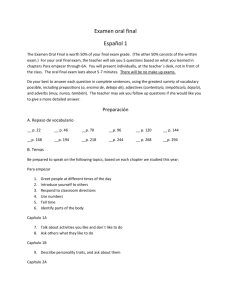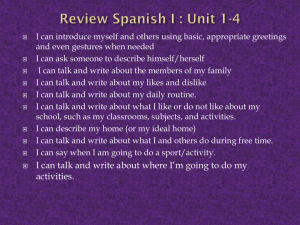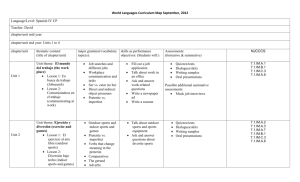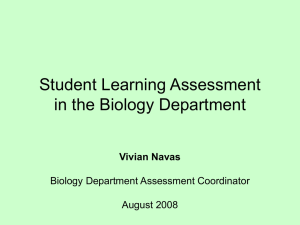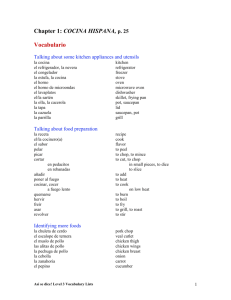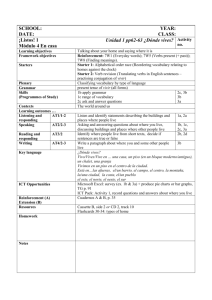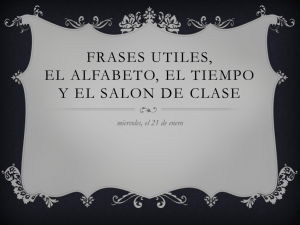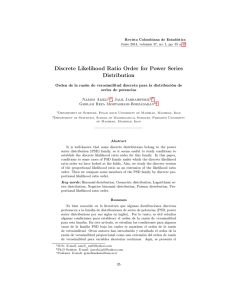h. Exposición de temas relacionados al curso.
advertisement
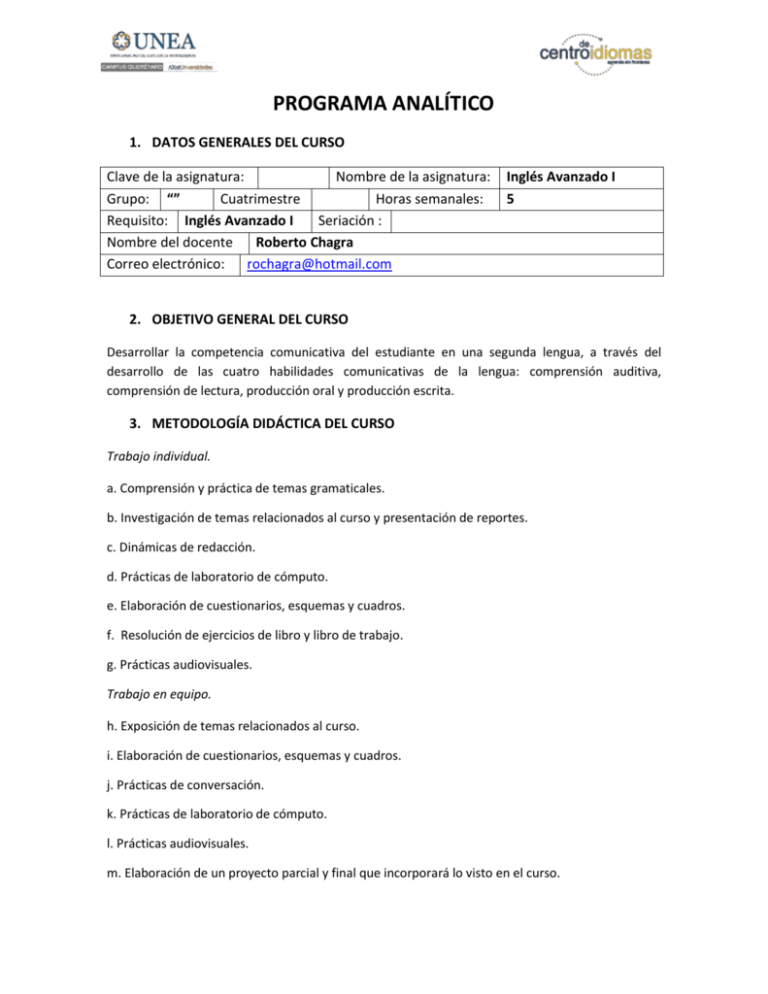
PROGRAMA ANALÍTICO 1. DATOS GENERALES DEL CURSO Clave de la asignatura: Nombre de la asignatura: Grupo: “” Cuatrimestre Horas semanales: Requisito: Inglés Avanzado I Seriación : Nombre del docente Roberto Chagra Correo electrónico: rochagra@hotmail.com Inglés Avanzado I 5 2. OBJETIVO GENERAL DEL CURSO Desarrollar la competencia comunicativa del estudiante en una segunda lengua, a través del desarrollo de las cuatro habilidades comunicativas de la lengua: comprensión auditiva, comprensión de lectura, producción oral y producción escrita. 3. METODOLOGÍA DIDÁCTICA DEL CURSO Trabajo individual. a. Comprensión y práctica de temas gramaticales. b. Investigación de temas relacionados al curso y presentación de reportes. c. Dinámicas de redacción. d. Prácticas de laboratorio de cómputo. e. Elaboración de cuestionarios, esquemas y cuadros. f. Resolución de ejercicios de libro y libro de trabajo. g. Prácticas audiovisuales. Trabajo en equipo. h. Exposición de temas relacionados al curso. i. Elaboración de cuestionarios, esquemas y cuadros. j. Prácticas de conversación. k. Prácticas de laboratorio de cómputo. l. Prácticas audiovisuales. m. Elaboración de un proyecto parcial y final que incorporará lo visto en el curso. 4. POLÍTICAS SOBRE LA FORMA EN QUE SE LLEVARÁ EL TRABAJO DEL ALUMNO Y DEL DOCENTE EN LA CLASE En la materia, posterior a una presentación personal tanto del alumno como del maestro, se dará lectura y explicación del reglamento, se expondrá al grupo el programa de estudios que se cursará y que más adelante se detalla, posteriormente se analizarán las distintas vías de evaluación y participación profesor – alumno. Se buscará mantener un ambiente de trabajo basado en el respeto por la opinión del otro, fomentando la tolerancia, la apertura a la discusión y capacidad de negociación; así como promover la importancia del trabajo individual y el trabajo en equipo. 5. TEMAS DEL CURSO Unit 3 Unit 2 Unit 1 UNIT The way we are (pages 1-10) Experiences (pages 11-20) Wonders of the world (pages 21-30) SPECIFIC OBJECTIVE People in a hurry Personality and carácter Best friends Describing individual habits The use of at least Talking about funny Little habits Things you didn’t know about Hopes and dreams Present perfect statements What are your secret dreams? Unusual experiences Present perfect and simple past questions and answers Good and bad experiences Reduced and unreduced forms of have Keeping the conversation going Responding to questions Travel Blogs Human wonders Superlatives Linking and deletion with superlatives Talking about natural wonders Making questions with How+ adjective Being a supportive listener Using superlatives for emphasis Travel talk World Records Interesting facts Unit 4 Unit 5 Unit 6 Family Life (pages 33-42) Food choices (pages 43-52) Managing life (pages 53-62) Family gripes Verbs let, make, help, have, get, want, ask, and tell. Talking about reasonable demands Building vocabulary with family memories Used to and would Giving opinions Agreeing Talking about ideal families Childhood memories Family activities Healthy food Talking about quantities of food Talking about; is it good for you? Taste of food Stressing new information Too, too much, too many, and enough Letting another person decide Polite refusals Reading about the world’s favorite snacks. Making plans Talking about the future Listening “ I hope you can come” Problems and solutions What’s advisable/ necessary/ preferable Reduction of verbs Ending phone conversations Friendly good-byes Phone habits Cluttered lives What to do with things 6. PLANEACIÓN CUATRIMESTRAL 23-May11 SEMANA OBJETIVO Students will learn how to describe people, needs, , personality and characters. CONTENIDO Talk about people’s behavior and personality, describe friends and people you admire, talk EXPERIENCIAS DE APRENDIZAJE CON DOCENTE Listening Listen to three conversations about best friends and then fill in a chart. Match each person with a EXPERIENCIAS DE APRENDIZAJE INDEPENDIENTES Vocabulary notebook Happy or sad? Learn new words and their opposites 22-06-11 13-06-11 al 17-06-11 06-06-11 al 10-0611 30-05-11 al 03-06-11 about people’s habits. Students will learn how to listen to conversations, talk about their experiences and sustain a conversation with their peers. Talk about your secret dreams. Describe experiences you have and haven’ piece of information, and then listen more information about each person. Reading Five things you didn’t know about you Writing Write a short description about yourself, learn useful expressions to include in a biography. Grammar Manner adverbs, adverbs before adjectives, adjective prefixes, Imperatives Vocabulary Behavior and personalities, personal qualities. Listening Listen to three conversations to identify the main topic: then choose the correct response to three comments. Reading Greetings from the Galapagos and I’m in Athens. Pronunciation Stress and intonation in questions Two travel blogs. Pronunciation Reduced and unreduced forms of have. Writing Write a blog describing an exciting experience. Use adverbs like fortunately, unfortunately and amazingly to show your attitude or feeling. Grammar Present perfect statements Present perfect and simple past questions and answers. Vocabulary Past participles of irregular verbs Review, First Exam and feedback Free talk Ask questions to find classmates who do interesting things. Vocabulary notebook Nice Outfit! Label pictures with new vocabulary Free talk Group game: Each person fills out a chart then group members compare answers and score points. 20-06-11 al 01-07-11 Listening What do you know? Take a quiz; Then listen to a quiz show to check your answers and answer questions. Students will practice superlatives and talk about human wonders, natural wonders, world records and the most incredible places. Travel Talk Listen to a radio interview and number photos in order; then listen and answer questions about the details. Reading World Records Fascinating facts from a book of world records. Writing Write a paragraph about a human or natural wonder in your country. Talk about human wonders like buildings and structures. Describe natural wonders and features. Add information about a place or thing. Grammar Superlatives Questions with how + adjective Vocabulary Buildings and structures Natural Features 11-07-11 al 15-07-11 Pronunciation Linking and deletion with superlatives Free talk The five greatest wonders Group work: Choose and rank your country’s five greatest wonders then compare lists with the class. Listening Reasonable demands? -Match each person with a parental demand; then listen and check your answers. 04-07-11 al 08-07-11 20-07-11 Vocabulary notebook From the mountains to the sea Draw and label a map to remember the vocabulary of natural features, buildings and structures. Students will learn how to talk about their memories, family, relatives , childhood. Talk about gripes people have about their family members and household rules. Talk about your memories of growing up. Family activities -Listen to three people describe their memories, and number the pictures in order; then listen again for more information. Vocabulary notebook Ways with verbs Write down information about new verbs Reading Rhonda’s Ramblings -A blog recounting a girl’s childhood experiences riding in the car with her brother. Pronunciation Reduction of used to Writing Write a blog about a memory of your childhood. Use past and present time makers. Grammar -Verbs let, make help, have, get, want, ask, and tell. -Used to and would. Vocabulary Types of families Relatives and extended family members. Review, Second Exam and feedback Free talk Family Histories Group work Prepare a short history of your family; then present your history to the group. 08-09-11 al 12-08-11 01-08-11 al 05-08-11 25-07-11 al 29-0711 Listening That sounds good Students will activate their speech using expressions like a bottle of, a quart of, a loaf of; they will also talk about their eating habits and way to cook food. Students will activate the use of the future speech and practice, plans, predictions and schedules. Describe your eating habits. Talk about healthy eating. Discuss different ways to cook or prepare food. Talk about the future; Plans, facts, predictions, and schedules. Offer advice and solutions to problems. Discuss phone habits Listen to conversations and number pictures in order; then match each picture with the best response. Snack Habits Listen to people talk about snacks, and number the pictures; then listen for details to complete the chart. Reading Popular snacks around the world A magazine article about five popular snack foods. Writing Write a short article about a snack food or traditional dish for a tourist pamphlet. Introduce examples with like, for example, and such as. Grammar Review of countable and uncountable nouns. Quantifiers a little, a few, very little, and very few. Too, too much, too many and enough. Vocabulary Containers and quantities. Methods of cooking. Listening I hope you can come Listen to three people responding to different invitations, and complete a chart. What should I do with these? Listen to three people discuss unwanted items, and identify what they do with them. Reading Getting rid of clutter An article giving ideas on ways to manage clutter and offering solutions to reader’s problems. Writing Write a question about a personal clutter problem, and write a reply to a classmate’s question. Link ideas with as long as, provided that and unless. Grammar The future with will, going to, and simple present. Use had better, want to, and might want to to say what’s advisable. Use have got to and going to have to say what’s necessary. Use would rather to say what’s preferable. Vocabulary Expressions with make and do Vocabulary notebook Fried Bananas Learn new words in combination with other words that often go with them. Pronunciation Stressing new information Free talk Do we have enough for the party? Group work; Agree with group members on what to buy for a party. Vocabulary notebook Do your best! Use a new expression in a sentence; then add another sentence to make its meaning clear. Pronunciation Reduction of want to, you’d better, going to have to, ought to and have got to. Free talk Who’s going to do what Group work; choose an event and prepare a list of all the things to get ready for it. 7. MATERIALES Y RECURSOS DIDÁCTICOS Libro de texto McCarthy, M., McCarten, J., & Sandiford, H. (2010). Touchstone 3: Cambridge University Press. Resource Teacher Book Gokay, J. (2008). Touchstone 3 Video Resource Book. United States of America: Cambridge University Press. Class Audio CD’s Carthy, M. M. (Compositor). (2010). Touchstone Class Audio CD's. [H. Sandiford, Intérprete, & J. McCarten, Dirección] New York, New York, United States of America. Libro de apoyo Regents English workbook 1, Robert J. Dixson, Prentice Hall Regents Hojas Blancas Cuaderno Plumones Colores Borradores Marca textos Proyector Computadora Bocinas o radiograbadora Pizarrón 8. REGLAS PARA LA CLASE Se tomará lista al inicio de la clase. Se tendrá tolerancia para el ingreso a clase de 10 minutos, posterior a este tiempo se considera falta. No hay retardos. El alumno deberá pedir permiso para salir del salón. El valor primordial que se deberá mantener en todas y cada una de las clases es el RESPETO. El número máximo de faltas permitidas para tener derecho a exámenes finales son 6 faltas. Las fechas de evaluación serán inamovibles una vez que se hayan fijado. Igualmente las diferentes entregas de trabajos, reportes, investigaciones. Calificación mínima aprobatoria es 6. Para exentar un examen: Promedio Mínimo de 9.5, no haber fallado o reprobado ninguna evaluación, trabajo, ni tarea y estar al corriente de sus pagos. Para tener derecho a examen Extraordinario: mínimo de asistencia, al corriente de sus pagos, pagar el examen y presentar su comprobante a tiempo. El profesor se reserva el derecho de expulsar de su clase a un alumno, así como de solicitar trabajos especiales. Previa valoración de la falta cometida o falta de atención a la clase. Los requisitos en la presentación y entrega de algún trabajo, proyecto, tarea, se darán por el profesor en su momento y no se recibirán los trabajos si no se cumplen con los mismos. No excepciones. En caso de plagio o fraude académico, los trabajos o exámenes involucrados serán TODOS anulados, sin importar el que copio o el que se dejó copiar. Sin excusas ni excepciones. Queda prohibido: celulares, comida, bebida, o pláticas ajenas al tema de clase dentro del salón. Cualquier aspecto no contemplado en este reglamento se buscará solucionar en su momento junto al coordinador correspondiente. 9. DESCRIPCIÓN DE LA PONDERACIÓN DEL CURSO a) SISTEMA DE EVALUACIÓN Evaluación Formativa Durante el semestre se realizará una evaluación continua dividida en: participación en clase, tareas, proyecto y portafolio, examen escrito y examen oral. b) REQUISITOS PARA APROBAR EL CURSO Cumplir con el límite de permitido de asistencias (80%). Obtener una calificación mínima aprobatoria de 6.0 Cumplir con los avances en el proyecto final de la materia, tareas, lecturas y trabajos. Llevar un portafolio ordenado y completo. Mostrar actitud de participación. c) PONDERACION DEL CURSO Se harán las siguientes evaluaciones por parcial, considerando la siguiente ponderación para evaluación: Participación y Actitud Trabajo en clase y workbook Tareas Examen escrito Examen oral Total 10% 10% 10% 40% 30% 100% NOTAS IMPORTANTES: Respecto al criterio que se considera para la evaluación de tareas, proyecto y portafolio será: orden, limpieza, redacción, ilustración, arte, complejidad y puntualidad en la entrega. En cuanto a las calificaciones sube a partir de .6, a excepción de las calificaciones reprobatorias. 10. CONTRIBUCIÓN AL PERFIL DE EGRESO Los alumnos lograrán iniciarse en su proceso de dominio del idioma inglés en un contexto global, donde puedan tener expresión y comprensión oral y escrita. Se espera que el alumno logre desarrollar las cuatro habilidades básicas en la adquisición de una lengua adicional. Lo cual contribuirá a tener una visión más amplia de sus habilidades, conocimiento y actitudes, logrando posicionarse de mejor manera en el ámbito laboral. 11. MAPA DE CONTENIDOS El método que se utiliza al interior de la Universidad de Estudios Avanzados tiene la base del sistema de la Universidad de Cambridge. Consta de 8 niveles con una duración de 54 hrs. por nivel, lo cual asegura un nivel avanzado en nuestros estudiantes que concluyen el sistema. Les genera una visión de cultura y negocios a nivel global. 12. COMPETENCIAS A DESARROLLAR Una competencia es la capacidad de movilizar recursos cognitivos para hacer frente a un tipo de situaciones con buen juicio, a su debido tiempo, para definir y solucionar verdaderos problemas. De tal forma que para la presente asignatura, la competencia a desarrollar es: COMUNICACIÓN. La cual tiene la finalidad de desarrollar entre los estudiantes las cuatro habilidades comunicativas: escuchar, hablar, leer y escribir en una segunda lengua. 13. VALORES Los valores que se busca promover en este curso son: Respeto Honestidad Responsabilidad, Orden
